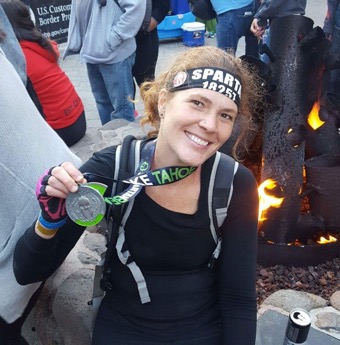It took crossing the finish line of my first marathon for me to consider myself an athlete. Although I enjoyed athletic activities throughout my life – softball, volleyball, track and field, swimming, hiking, skiing – it wasn’t until I took up running as an adult that I identified as an athlete. I became increasingly interested in working out to improve my body’s strength and health, more than to improve its appearance. I began to appreciate myself and my abilities, setting goals and then accomplishing them became addictive.
Life brings challenges and when things became unbearable, running became my therapy, my salvation. I could enter a meditative state, living in the moment, staying aware of the beautiful nature around me, and working to control my breathing. It helped keep my anxiety manageable and mood elevated. I see now how fortuitous it was that I developed healthy habits and the discipline of caring for my body with regular exercise prior to being diagnosed with lymphangioleiomyomatosis (LAM).
I found out about the mysterious lung cysts in my lungs the week before my 46th birthday. It took another two months to confirm the probable diagnosis after hearing the name for the first time. This shook me to my core. I have always been a highly energetic, active person. I rarely sit down. I am a physical therapist, always encouraging others to exercise and stay fit. At a time when my life was in crisis, my children were growing up, transitions were at hand, I had discovered an athlete within myself and had been hanging onto this identity for dear life. What if that was all taken away? Who would I be? How would I live? Would I be able to be happy? I not only looked forward to a relationship with grandchildren someday, I wanted to be that grandma that is still skiing and jumping on the trampoline with them. My profession, my pleasures, my mental health… they all revolve around activity and athleticism. It was being an athlete that gave me the strength to get through a challenging time in my life. Crushing goals and taking on new challenges is what makes me feel strong, capable, and resilient. I decided that LAM would just be another challenge to take on and crush.
I kept living my life, but it seemed doubts were always creeping in. In some ways, it was validating to realize that there was a reason that hill training was so hard for me. No matter how much I did it, I never felt that I improved. I was always struggling to catch my breath, my heart rate increasing to unreasonable levels. A simple oximeter showed that while running up hills and in elevation, my oxygen saturations would often drop, causing my heart to have to work harder to keep up. When a stress echo showed probable pulmonary hypertension and left atrial dilation, the worries increased. I know that I need to maintain a healthy body weight and maximize my cardiovascular fitness to stay functional, but how much exercise is too much? Could my stubbornness and tendency to push through pain and discomfort be causing damage that could shorten my life span?
Runners develop mental strength and inner dialogue to push through long runs. It is demoralizing to always be questioning your own body and not feel like you can trust your own symptoms. It is also difficult to convey to others. No one wants to be that person always slowing the group down. I have confided in several running buddies about LAM, but not everyone seems convinced. I look completely healthy, have a mild case, and am sure it is hard to imagine there is anything wrong with me. Being a competitive, independent spirit, it is hard for me to admit weakness. I feel like I am being judged when I walk up hills during a race. I have had several people dismiss my symptoms when I get concerned, implying it is in my head or even suggesting that my breathlessness is normal, “Everyone gets that!”
Another challenge is debilitating fatigue. I have a very difficult time managing my energy. Recovery after a long run is getting more difficult. I run a race knowing that when the adrenaline dies off, I will likely be feverish and ill, practically unable to move. I pay for it for days sometimes. My days seem to be getting shorter and shorter. I struggle to stay active in the evenings at all. I am exercising less often lately, so that I have the energy to do other things. It is so hard trying to find the balance.

Despite the challenges, being an athlete, while having LAM, has benefits. I believe that being fit prior to getting LAM has been a great asset. It is easier for me to continue to take care of myself, because it was already my lifestyle, plus I started the journey in optimal health. I had worked for years on my breathing through running and yoga. I know that it has been helpful. I am learning to make small adaptations, like walking during runs, especially up hills. Listening to my body and being willing to just cancel runs when I am not okay is necessary. Extra sleep is crucial. There is an internal drive to try all the activities on my bucket list as soon as possible. The knowledge that there are no guarantees in this life becomes a reality when you get diagnosed with a rare disease. Instead of putting things off for the future, I try to do them now! This is a fantastic way to live. I have much appreciation for the suffering of my fellow LAM sisters and am grateful every single day for my own path and abilities. I run with the knowledge that so many can’t. I feel like I carry those women with me. They provide me with much motivation to keep going, and I desire to inspire them. Every single person can improve their health in some way, and I hope to help others to do that.
Melissa is a 49 year old mother of three, recreational athlete, physical therapist, and lover of life. She was diagnosed with sporadic LAM at the age of 46.





Keep running for me, sissy! Thanks for the inspiration!